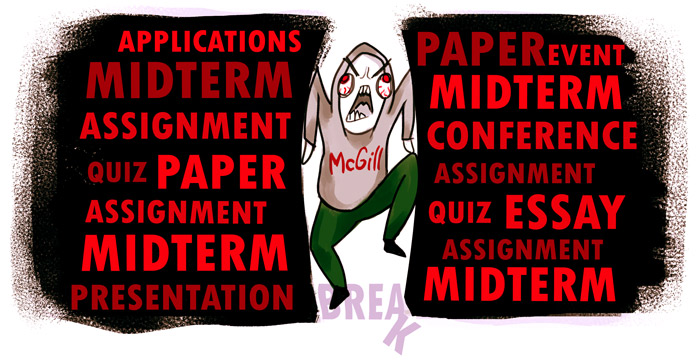McGill’s Winter 2017 semester began on Jan. 4, before other Montreal universities including Concordia and Université de Montréal. This start date was initially set by the Committee on Enrolment and Student Affairs (CESA) and sent to the Senate for approval in May 2013. In their proposed calendar for this academic year, CESA made the winter break one day shorter so that the term could accommodate an exam prep day.
This was done in consideration of the 2011 Senate calendar guidelines, which recommend a break between Fall and Winter terms, a prep day or weekend prior to exams, and a 10-day exam schedule on top of McGill’s 13-week term–one of the longest among Canadian universities.
University Registrar and Executive Director Kathleen Massey said start and end dates are also intended to reduce housing costs for students, to allow students to begin summer jobs or internships at the beginning of May.
The Students’ Society of McGill University (SSMU) Vice-President (VP) University Affairs Erin Sobat said that the start date is understandable given the constraints of term guidelines.
“While I think it would definitely be preferable for most students and professors to begin classes next week, McGill's start date is consistent with many other universities in Canada,” Sobat wrote in an email to The McGill Tribune. “In addition, December final exams ended slightly earlier this year to give everyone at least a two-week break. Since it's the Add/Drop Period until Jan. 17, many students won't come back until [the weekend of Jan. 7] anyway.”
Sobat said that the university guidelines do not allot a time for a Fall break.
“There's a clear inconsistency between the Fall and Winter terms when it comes to time off,” Sobat wrote. “Part of this is due to tighter timelines in the Fall with the December holiday break. However, it's also a historical difference. Most courses used to operate on a full-year schedule and so assessments were more spread out. Since that's changed, I think the Fall term has become more intense for many students, particularly first-years, and the mid-term and November periods, when the days get shorter, can be particularly challenging.”
In 2015, a working group was established by Deputy Provost (Student Life and Learning) Ollivier Dyens in response to a SSMU request to adopt a Fall reading break. In its June 2015 report on its findings, the working group proposed a break of two days that would be added to Canadian Thanksgiving. To incorporate the proposal, the report noted that trade-offs, such as commencing classes before Labour Day, were necessary to maintain the 13-week term.
The working group also reasoned that the Fall term is particularly difficult for students, evidenced by McGill Health Services’ reported increase in demand over the last five years in October and November. Further, students have overwhelmingly supported a Fall break. In a 2015 survey conducted by Enrolment Services, 71.5 per cent of respondents supported the initiative. The proposal was also supported by major student associations, such as the SSMU and the Arts Undergraduate Society (AUS).
Julia Thome, U2 Arts, said that the start date had interrupted her experience of the holidays.
“The early return wasn't altogether awful,” Thome said. “But it did complicate my family's travel plans and the short break made the holiday season more stressful than relaxing.”








